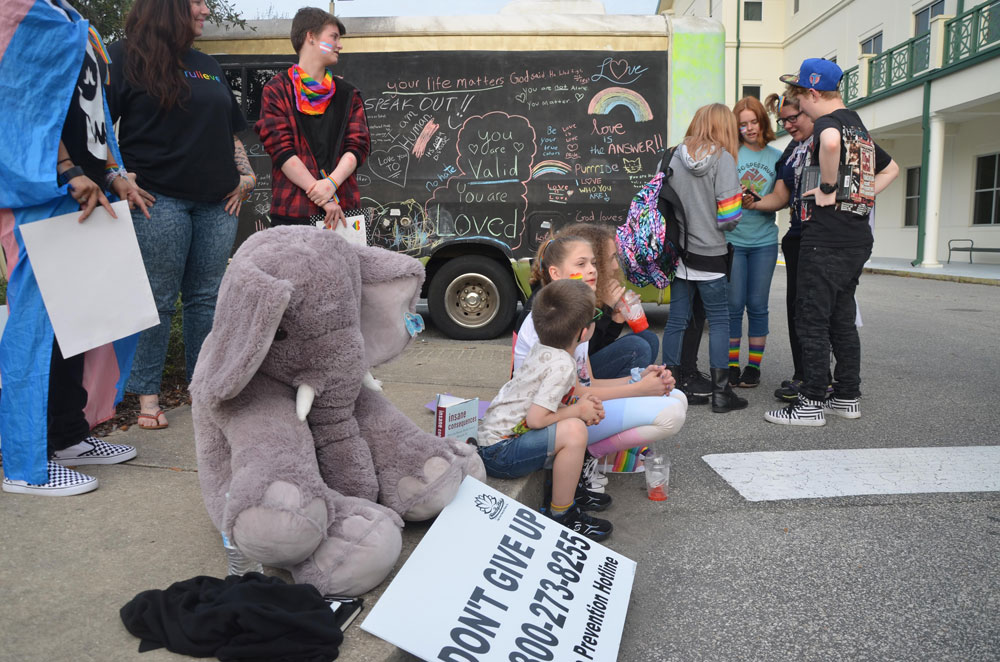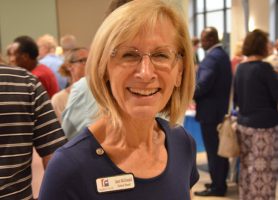
Meeting after meeting, month after month since last fall, the most contentious issue before the Flagler County School Board was whether and how to recognize and protect the rights of transgender students.
The focus was a proposed board policy prohibiting sexual and other forms of discrimination. The contention was over two words: whether to add “gender identity” to the policy’s opening lines, and make it read this way: “No person shall, on the basis of race, color, religion, gender, age, marital status, sexual orientation, gender identity, pregnancy, disability, political or religious beliefs, national or ethic origin, or genetic information, be excluded from participation in, be denied the benefits of, or be subjected to discrimination under any education program or activity, or in any employment conditions or practices conducted by this School District, except as provided by law.”
Those two words turned long segments of board meetings into showcases of often soaring eloquence–by by middle and high school students, inclusing several transgender boys and girls, by school faculty and staff members, by parents, by residents–and, more rarely, occasional anger or lack of decorum.
On February 18, before what would prove to be one of the last ordinary, pre-coronavirus school board meetings, the two groups on opposite sides of those two words–gender identity–demonstrated outside the Government Services Building, and intended to continue applying pressure one or the other on school board members until the day of the vote on the policy.
That day came last Tuesday, without demonstrations. The coronavirus emergency and the school board meeting held virtually, with each board members and top staffers in their own homes or offices, made sure of that. And the vote went 4-1 for the policy without the two words, with Board members Maria Barbosa, Andy Dance, Janet McDonald and Trevor Tucker on one side and Colleen Conklin on the other. But if there was a lack of passion from the absence of an audience, board members made up for it at least in part.
Dance appeared somewhat reluctant to approve the policy as such, but was willing to do so on the assumption that the protections the word “gender identity” would imply would and should be written into district procedures, as opposed to policy.
“It’s kind of odd having the discussion without the room full of people that would normally be there, so to them, [apologies] that our meeting is a little bit unusual in that regard,” Dance said.
McDonald interrupted him to say that “this is actually our meeting, so it’s not about communicating with them necessarily. It’s about sharing that–it’s a board meeting in the public,” she said. “Virtual, at best, but in the public.”

Asked in an interview what counsel she had given Dance on the issue, School Board Attorney Kristy Gavin said Thursday: “The only thing I can say when he’s saying form counsel, it was my statement to the board: we had put up for advertisement the changes that were being made and that what is codified and included in the top opening paragraph [of the policy] is what is codified from federal law and case law as what is recognized as protected entities.” Gavin said that what she’s also impressed on board members and the superintendent is that “all students, when it comes to bullying, are protected.”
Barbosa called on parents to change their child’s name through state law before asking a teacher to call the child by the new name, and Tucker declined to speak on the issue. McDonald said the “firestorm”: was created around the issue even after the original incident at Matanzas had been investigated, with no findings, while “very happy accommodations were made at FPC while the ones at Matanzas were rejected.” McDonald was accurate about the findings of the investigation, but her assessment did not recognize the student’s and the family’s dissatisfaction with the way the investigation was handled–internally, without an independent investigation. The student transferred to Flagler Palm Coast High School, where he has been happier.
“What we do as a school district can never ensure that there are people, other students in the community, who will do what students do in any community,” McDonald said. “They’re children. They may not have the respect and the safety and the security of other students in their hearts, and they will reach out and do things. But that does not mean that that’s what the schools endorse, that the teachers purport, or that the administration condones.” McDonald blamed “a big political push” to add the two words to the policy, though there had been no evidence of “political” motivations behind the local movement in the last few months.
Conklin sharply disagreed with McDonald’s take. “If this board for one second thinks that we do not have students that are dealing with these situations in our classrooms, we are completely tone deaf,” she said. “And we did not take a second to listen to the students that came and spoke to us and shared their personal experiences. We have amazing and outstanding educators in this county, but if you think that we don’t have a few that need additional training to develop some tolerance and understanding on how to work with all students, I think we’re tone deaf to that.” She conceded that the “medical journals” may have politicized the issue, but that she was basing her assessments on independent, sources.
“Training is a different area than policy,” McDonald said. We’re talking about policy.”
“Please, Dr. Conklin, do not tell us we do not care,” Barbosa said. “We do care. Just because we do not have one word in the policy does not mean we do not care. We do care.”
“I appreciate everyone’s conversation,” McDonald said after the vote, “and my hope and thought is that anyone who would like to help work on some of the things that they think they see, please work with the school board members if you’d like to do that, or with the people in the building and the staff that will be working on any training ideas or any information.”
Then McDonald added a remarkable statement: “I asked for the number of reports for students who are being disenfranchised or disparaged or marginalized and from all schools, there were no reports, so part of it is a perception of an issue and that we can;t deal with unless we have specific incidents that we can draw from.” Remarkable, because it implied that there are no reports of bullying in schools, which is not the case.
Conklin had addressed the matter earlier in the discussion, telling her colleagues she knew how the vote would go but read her own “hail Mary” plea and asked them to keep their minds open. “I’ve come to realize that our policy may indeed not cover all students,” she said, noting that she’d been told that if she were to press for the two words in the policy, this would be her last term on the board. (She has been serving since 2000.) She said her own research led to corrections in her own understanding of “gender,” “gender identity,” and “gender dysphoria,” which she now acknowledges is a disorder, in context.
“Gender dysphoria is transitional. In order to be diagnosed, A definite mismatch between the assigned gender and experienced/expressed gender for at least 6 months duration. This may resolve itself but it may not,” Conklin said. “Students may come out of this, but they may then fully transition to become fully transgender, where they accept their gender identity as being something different than what they were biologically born with. That’s really not up to you or I, it’s not up to anybody to decide whether that is wrong or right.”
With that added understanding, she had to ask herself whether the current policy does provide the necessary protection for transgender students, given the much higher rates of bullying and suicide involving transgender students. The two words in policy, she said, would add a later of protection “and make sure that students and parents know that we care about protecting all students in this way.” Conklin asked her colleagues for “reconsideration” of the two words.
Absent the presence of a live audience, Gavin had read several written public comments into the record.
“Why is it so hard to do the HUMANE thing and add 2 simple words to Policy 217, to bring Flagler County up to the standards of the majority of counties in the state of Florida, to treat ALL students in our county with the respect they deserve, as human beings?” Jennifer Bertrand, parent of the boy whose struggles as a transgender student at Matanzas High School last year led to the months of debate. “It amazes me daily that so many of the kids within our schools are so accepting of their friends and classmates for who they are, yet the very people ELECTED to protect them won’t do just that. You all heard stories, firsthand from several students who have been bullied for being who they are. Those students showed such incredible bravery and poured out their hearts to you to show you how much this policy change means to them and nothing was done for these students. No compassion shown, just a ‘thank you for your remarks.’”
![]()





























Merrill S Shapiro says
Hooray for Colleen Conklin who is on the side of justice on this question. I am sure I am one of many who would encourage her and Andy Dance to seek, at future Board meetings, to add the words “gender identity” to the opening lines of this policy.
Mark says
How about “No person shall be discriminated for any reason”.
C says
Although it may be thought of as more specific, I view the language as already a part of the Gender category.
Robert says
Aside from Dr Conklin and Mr Dance, why does the rest of the Board refuse to accept two words ? Pull your head outta the sand Ms McDonald, when you finally do that, the election will be over and you won’t be on the school board anymore.